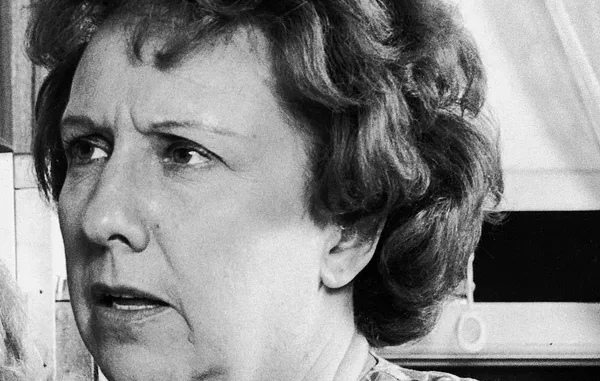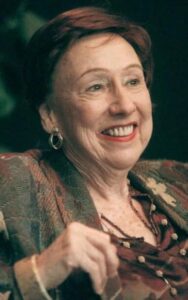
It takes a smart woman to play a truly great dingbat.
Many actors can and do play stupid, and some of them aren’t acting. But Jean Stapleton, who died this weekend at the age of 90, was something apart: A thoughtful, intelligent, Broadway-trained actor who used all her considerable skill and charisma to create one of TV’s most beloved icons: All in the Family’s Edith Bunker .
Few characters are more indelible than Edith, and few performances are more easily and happily called to mind. To think of All in the Family — the industry-altering hit that ran on CBS from 1971 to 1979 — is to see Stapleton in your mind’s eye. There she is, doing that endearingly comic run/shuffle to the kitchen to get her husband, Archie, a beer; calling his name in that distinctive and yet never grating high-pitched, nasal tone; afraidly shooing people away from his chair; flashing them apologetic glances when he says something rude and stupid; and, for reasons that were not always clear but were crucial to the show’s success, smiling at Archie with a look of complete joy and unconditional love.

There were no weak links in All in the Family: Norman Lear’s guiding hand, Carroll O’Connor’s star turn, Rob Reiner’s and Sally Struthers’ work in support — they all combined to make All in the Family the critically acclaimed smash it became. Yet there is something about Stapleton’s performance that just seems essential to the show’s success — which is one reason why the Edith-less sequel, Archie Bunker’s Place, is now largely forgotten.
If Archie’s bigotry and anger drove the show, Edith’s warm kept it from running off the road. Her affection for Archie gave us permission to find something lovable, or at least redeemable, in him. Her strength allows us to think her compliance — that willingness to let Archie call her a dingbat and tell her to stifle — was built on love, not fear. Edith could only be pushed so far: She was naive and sweet, but she wasn’t stupid or weak, and she wouldn’t put up with anything that threatened her family.
If you need any more proof of how good Stapleton was as an actor, look at the things the writers gave her to do. Some of the show’s most memorable episodes rely upon Stapleton’s stage-honed gifts as a dramatic actress — gifts that allowed her to take Edith through menopause and a cancer scare, or to fight off a would-be rapist (the kind of storyline no network sitcom today would dare handle).
As a performer, she was also smart enough to know when it was time to move on. By 1978, the All in the Family viewers initially embraced was unwinding: Reiner and Struthers were leaving, a new child was being added (almost always a kiss of death), and the show was transitioning into Archie Bunker’s Place. Stapleton could have hung on to a high-paying job that had already gained her eight Emmy nominations and three Emmys — but she was ready to go, and she left, seemingly with no regrets.